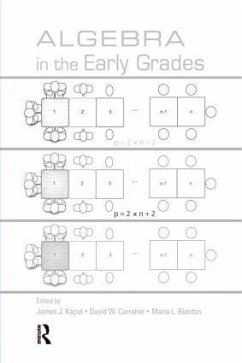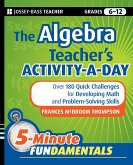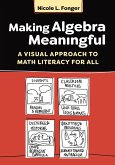Maria L. Blanton / David W. Carraher (eds.)
Algebra in the Early Grades
Herausgeber: Kaput, James J; Blanton, Maria L; Carraher, David W
Schade – dieser Artikel ist leider ausverkauft. Sobald wir wissen, ob und wann der Artikel wieder verfügbar ist, informieren wir Sie an dieser Stelle.
Maria L. Blanton / David W. Carraher (eds.)
Algebra in the Early Grades
Herausgeber: Kaput, James J; Blanton, Maria L; Carraher, David W
- Broschiertes Buch
- Merkliste
- Auf die Merkliste
- Bewerten Bewerten
- Teilen
- Produkt teilen
- Produkterinnerung
- Produkterinnerung
This book-the first to offer a comprehensive, research-based, multi-faceted look at issues in early algebra-provides a rationale for a stronger and more sustained approach to algebra in school.
Andere Kunden interessierten sich auch für
![The Algebra Teacher's Activity-a-Day, Grades 6-12 The Algebra Teacher's Activity-a-Day, Grades 6-12]() Frances Mcbroom ThompsonThe Algebra Teacher's Activity-a-Day, Grades 6-1220,99 €
Frances Mcbroom ThompsonThe Algebra Teacher's Activity-a-Day, Grades 6-1220,99 €![Making Algebra Meaningful Making Algebra Meaningful]() Nicole L FongerMaking Algebra Meaningful49,99 €
Nicole L FongerMaking Algebra Meaningful49,99 €![Primary Mathematics Pedagogy at the Intersection of Education Reform, Policy, and Culture Primary Mathematics Pedagogy at the Intersection of Education Reform, Policy, and Culture]() Sarah MurrayPrimary Mathematics Pedagogy at the Intersection of Education Reform, Policy, and Culture61,99 €
Sarah MurrayPrimary Mathematics Pedagogy at the Intersection of Education Reform, Policy, and Culture61,99 €![Research Issues in the Learning and Teaching of Algebra Research Issues in the Learning and Teaching of Algebra]() Research Issues in the Learning and Teaching of Algebra66,99 €
Research Issues in the Learning and Teaching of Algebra66,99 €![How to Develop Confident Mathematicians in the Early Years How to Develop Confident Mathematicians in the Early Years]() Tony CottonHow to Develop Confident Mathematicians in the Early Years40,99 €
Tony CottonHow to Develop Confident Mathematicians in the Early Years40,99 €![Becoming a Primary Mathematics Specialist Teacher Becoming a Primary Mathematics Specialist Teacher]() Gina DonaldsonBecoming a Primary Mathematics Specialist Teacher50,99 €
Gina DonaldsonBecoming a Primary Mathematics Specialist Teacher50,99 €
This book-the first to offer a comprehensive, research-based, multi-faceted look at issues in early algebra-provides a rationale for a stronger and more sustained approach to algebra in school.
Produktdetails
- Produktdetails
- Verlag: Taylor & Francis Ltd (Sales)
- Seitenzahl: 552
- Erscheinungstermin: 14. September 2007
- Englisch
- Abmessung: 227mm x 163mm x 28mm
- Gewicht: 717g
- ISBN-13: 9780805854732
- ISBN-10: 0805854738
- Artikelnr.: 21498668
- Herstellerkennzeichnung
- Libri GmbH
- Europaallee 1
- 36244 Bad Hersfeld
- gpsr@libri.de
- Verlag: Taylor & Francis Ltd (Sales)
- Seitenzahl: 552
- Erscheinungstermin: 14. September 2007
- Englisch
- Abmessung: 227mm x 163mm x 28mm
- Gewicht: 717g
- ISBN-13: 9780805854732
- ISBN-10: 0805854738
- Artikelnr.: 21498668
- Herstellerkennzeichnung
- Libri GmbH
- Europaallee 1
- 36244 Bad Hersfeld
- gpsr@libri.de
Kaput, James J.; Carraher, David W.; Blanton, Maria L.
Contents: Preface. Skeptic's Guide to Algebra in the Early Grades. Part I: The Nature of Early Algebra.J.J. Kaput
What Is Algebra? What Is Algebraic Reasoning? J.J. Kaput
M.L. Blanton
L.M. Armella
Algebra From a Symbolization Point of View. J. Mason
Making Use of Children's Powers to Produce Algebraic Thinking. J.P. Smith III
P.W. Thompson
Quantitative Reasoning and the Development of Algebraic Reasoning. E. Smith
Representational Thinking as a Framework for Introducing Functions in the Elementary Curriculum. Part II:Students' Capacity for Algebraic Thinking. V. Bastable
D
Schifter
Classroom Stories: Examples of Elementary Students Engaged in Early Algebra. C. Tierney
S. Monk
Children's Reasoning About Change Over Time. N. Mark-Zigdon
D. Tirosh
What Is a Legitimate Arithmetic Number Sentence? The Case of Kindergarten and First Grade Children. T. Boester
R. Lehrer
Visualizing Algebraic Reasoning. D.W. Carraher
A.D. Schliemann
J.L. Schwartz
Early Algebra Is Not the Same as Algebra Early. B.M. Brizuela
D. Earnest
Multiple Notational Systems and Algebraic Understandings: The Case of the "Best Deal" Problem. I. Peled
D.W. Carraher
Signed Numbers and Algebraic Thinking. Part III: Issues of Implementation: Taking Early Algebra to the Classrooms. M.L. Franke
T.P. Carpenter
D. Battey
Content Matters: The Case of Algebra Reasoning in Teacher Professional Development. M.L. Blanton
J.J. Kaput
Building District Capacity for Teacher Development in Algebraic Reasoning. B. Dougherty
Measure Up: A Quantitative View of Early Algebra. D. Schifter
S. Monk
S.J. Russell
V. Bastable
Early Algebra: What Does Understanding the Laws of Arithmetic Mean in the Elementary Grades? P. Goldenberg
N. Shteingold
Early Algebra: The MW Perspective. Afterword: A. Schoenfeld
Early Algebra as Mathematical Sense-Making.
What Is Algebra? What Is Algebraic Reasoning? J.J. Kaput
M.L. Blanton
L.M. Armella
Algebra From a Symbolization Point of View. J. Mason
Making Use of Children's Powers to Produce Algebraic Thinking. J.P. Smith III
P.W. Thompson
Quantitative Reasoning and the Development of Algebraic Reasoning. E. Smith
Representational Thinking as a Framework for Introducing Functions in the Elementary Curriculum. Part II:Students' Capacity for Algebraic Thinking. V. Bastable
D
Schifter
Classroom Stories: Examples of Elementary Students Engaged in Early Algebra. C. Tierney
S. Monk
Children's Reasoning About Change Over Time. N. Mark-Zigdon
D. Tirosh
What Is a Legitimate Arithmetic Number Sentence? The Case of Kindergarten and First Grade Children. T. Boester
R. Lehrer
Visualizing Algebraic Reasoning. D.W. Carraher
A.D. Schliemann
J.L. Schwartz
Early Algebra Is Not the Same as Algebra Early. B.M. Brizuela
D. Earnest
Multiple Notational Systems and Algebraic Understandings: The Case of the "Best Deal" Problem. I. Peled
D.W. Carraher
Signed Numbers and Algebraic Thinking. Part III: Issues of Implementation: Taking Early Algebra to the Classrooms. M.L. Franke
T.P. Carpenter
D. Battey
Content Matters: The Case of Algebra Reasoning in Teacher Professional Development. M.L. Blanton
J.J. Kaput
Building District Capacity for Teacher Development in Algebraic Reasoning. B. Dougherty
Measure Up: A Quantitative View of Early Algebra. D. Schifter
S. Monk
S.J. Russell
V. Bastable
Early Algebra: What Does Understanding the Laws of Arithmetic Mean in the Elementary Grades? P. Goldenberg
N. Shteingold
Early Algebra: The MW Perspective. Afterword: A. Schoenfeld
Early Algebra as Mathematical Sense-Making.
Contents: Preface. Skeptic's Guide to Algebra in the Early Grades. Part I: The Nature of Early Algebra.J.J. Kaput
What Is Algebra? What Is Algebraic Reasoning? J.J. Kaput
M.L. Blanton
L.M. Armella
Algebra From a Symbolization Point of View. J. Mason
Making Use of Children's Powers to Produce Algebraic Thinking. J.P. Smith III
P.W. Thompson
Quantitative Reasoning and the Development of Algebraic Reasoning. E. Smith
Representational Thinking as a Framework for Introducing Functions in the Elementary Curriculum. Part II:Students' Capacity for Algebraic Thinking. V. Bastable
D
Schifter
Classroom Stories: Examples of Elementary Students Engaged in Early Algebra. C. Tierney
S. Monk
Children's Reasoning About Change Over Time. N. Mark-Zigdon
D. Tirosh
What Is a Legitimate Arithmetic Number Sentence? The Case of Kindergarten and First Grade Children. T. Boester
R. Lehrer
Visualizing Algebraic Reasoning. D.W. Carraher
A.D. Schliemann
J.L. Schwartz
Early Algebra Is Not the Same as Algebra Early. B.M. Brizuela
D. Earnest
Multiple Notational Systems and Algebraic Understandings: The Case of the "Best Deal" Problem. I. Peled
D.W. Carraher
Signed Numbers and Algebraic Thinking. Part III: Issues of Implementation: Taking Early Algebra to the Classrooms. M.L. Franke
T.P. Carpenter
D. Battey
Content Matters: The Case of Algebra Reasoning in Teacher Professional Development. M.L. Blanton
J.J. Kaput
Building District Capacity for Teacher Development in Algebraic Reasoning. B. Dougherty
Measure Up: A Quantitative View of Early Algebra. D. Schifter
S. Monk
S.J. Russell
V. Bastable
Early Algebra: What Does Understanding the Laws of Arithmetic Mean in the Elementary Grades? P. Goldenberg
N. Shteingold
Early Algebra: The MW Perspective. Afterword: A. Schoenfeld
Early Algebra as Mathematical Sense-Making.
What Is Algebra? What Is Algebraic Reasoning? J.J. Kaput
M.L. Blanton
L.M. Armella
Algebra From a Symbolization Point of View. J. Mason
Making Use of Children's Powers to Produce Algebraic Thinking. J.P. Smith III
P.W. Thompson
Quantitative Reasoning and the Development of Algebraic Reasoning. E. Smith
Representational Thinking as a Framework for Introducing Functions in the Elementary Curriculum. Part II:Students' Capacity for Algebraic Thinking. V. Bastable
D
Schifter
Classroom Stories: Examples of Elementary Students Engaged in Early Algebra. C. Tierney
S. Monk
Children's Reasoning About Change Over Time. N. Mark-Zigdon
D. Tirosh
What Is a Legitimate Arithmetic Number Sentence? The Case of Kindergarten and First Grade Children. T. Boester
R. Lehrer
Visualizing Algebraic Reasoning. D.W. Carraher
A.D. Schliemann
J.L. Schwartz
Early Algebra Is Not the Same as Algebra Early. B.M. Brizuela
D. Earnest
Multiple Notational Systems and Algebraic Understandings: The Case of the "Best Deal" Problem. I. Peled
D.W. Carraher
Signed Numbers and Algebraic Thinking. Part III: Issues of Implementation: Taking Early Algebra to the Classrooms. M.L. Franke
T.P. Carpenter
D. Battey
Content Matters: The Case of Algebra Reasoning in Teacher Professional Development. M.L. Blanton
J.J. Kaput
Building District Capacity for Teacher Development in Algebraic Reasoning. B. Dougherty
Measure Up: A Quantitative View of Early Algebra. D. Schifter
S. Monk
S.J. Russell
V. Bastable
Early Algebra: What Does Understanding the Laws of Arithmetic Mean in the Elementary Grades? P. Goldenberg
N. Shteingold
Early Algebra: The MW Perspective. Afterword: A. Schoenfeld
Early Algebra as Mathematical Sense-Making.







